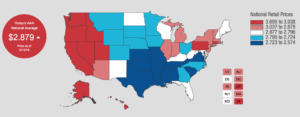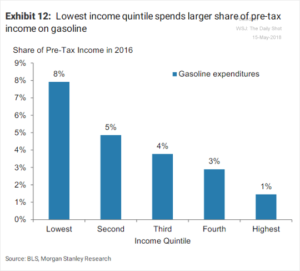
Image: earthfinds.co.ug
OPEC nations have been reducing their oil output over the past few months, while the US has been increasing its output – to the point where the US has become a net oil exporting country. Yet, with the US pulling out of the Iran Nuclear Agreement, oil prices shot up even higher. For a regular gallon of gas, the price has increased 23 % over a year ago.

Source: gasprices.aaa.com – 5/15/18
Prices are highest in the Western states and East Coast where there are more environmental regulations requiring special gas additives and higher taxes for road maintenance. Major gasoline price rises anywhere hit the lowest income groups the hardest, yet even harder in expensive Western and East Coast states.

Sources: Bureau of Labor Statistics, Morgan Stanley Research, The Wall Street Journal, The Daily Shot – 5/15/18
Low income people are already squeezed by higher rents, fewer low cost homes to purchase, rising health care costs, higher health insurance for individuals by undermining the Obamacare exchanges, higher debt, low wages and longer commutes (as often they don’t have the money to live near work). Longer commutes mean that a gasoline price increases hurt these long commuters harder than other drivers.
Next steps:
We need to get back to a focus on the 80 % and the lower income 10 – 20 % who are taking the brunt of price increases for necessities across our economy. We need to invest in affordable housing near employment to reduce commutes (reduce as purchases), public transportation in rail, bus and tram systems. While, reducing environment regulations may help the oil industry to pump more oil, we do so at the cost of our environment and health in the future – where quite often lower income people live near refineries and pollution leaking tank sites. Investing in renewable energy sources to reduce our need for costly gas offers more alternatives and is an environmentally sound strategy. Plus, corporate employers could help hourly and lower salary workers with public transportation credits to be used to reduce expenses of driving by supporting car pools and using public transportation. Local and State government can offer tax deductions on the matching grants to corporations that offer public transportation and carpooling credits.
